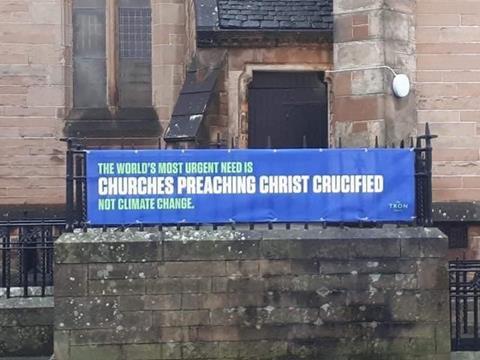Evangelicals in the USA didn’t get their environmental scepticism from the Bible. It’s come from elsewhere, explains Neall Pogue

In 1993 a popular Christian high school science textbook in the USA denied the existence of human-caused global warming. To reiterate the overall message, a poem featured at the top of the section read, “Roses are red, Violets are blue, They both grow better with more CO2.”
Elsewhere in the book, the authors dismissed the validity of other environmental issues including acid rain, ozone depletion and the dangers of pesticides. Such a position reflected the anti-environmental views held amongst the wider white conservative evangelical community in the United States that make up the religious right movement.
Thirty years on, opposition to environmental concerns may seem like an expected position held by millions of white evangelicals in the US.
Historical evidence, however, fascinatingly demonstrates that supporters of the religious right did not always hold such anti-environmental views. Instead, this community supported nature friendly philosophies from the 1970s to the early 1990s. After all, disregard for the environment is not theologically defensible. Nothing in the scriptures condemns nature protection initiatives including trying to curb human-caused climate change. The ominous sounding commandments in Genesis to “dominate” and “subdue” the natural world does not imply permission to wipe out entire species and one would also need to willingly overlook the numerous other biblical statements expressing value for the earth, including God’s own assessments in Genesis 1 which repeats seven times that his creation was “good.”
Anti-environmental views as demonstrated in the Christian school textbook and among the larger white conservative evangelical community took time to develop and was not a consequence of religious faith.
At the birth of the modern environmental movement in 1970, conservative evangelicals wanted to protect the earth. That year Francis Schaeffer, the well respected and prolific writer within the conservative evangelical community, published his book entitled Pollution and the Death of Man. In it, Schaeffer admitted that Christians have not been good protectors of the environment. This situation, he stated, must change and he offered a variety of theological reasons why Christians must be kind to God’s earth. He argued that like the natural world, humanity was a creation of God. Consequently, people should care for the earth as they should themselves. In other words, humanity may be God’s best achievement, but people are also a part of the created order and therefore share a relationship with all other things including the animals and trees.
Schaeffer was not the only conservative evangelical concerned with healing the natural world. In a 1971 Southern Baptist Convention poll over 81 per cent of pastors and 76.3 per cent of Sunday School teachers reported that Southern Baptist churches should be involved with activities to solve air and water pollution problems.

The support of eco-friendly views lasted until the early 1990s when efforts from politically conservative think tanks and special advocacy groups such as the John Birch Society started pushing new anti-environmental positions and these views quickly found a readership among conservative evangelical leaders. One magazine, The New American, denounced mainstream scientists and offered the reader an alternative reality in which global warming was fake and connected with a conspiracy theory. The conspiracy explained that environmentalists worshipped nature and wanted to control the world.
Throughout the early 1990s, such theories and other misinformation crept its way through the conservative evangelical community. Eventually, the image of earth worshipping environmentalists proved far too great, especially when accompanied with a good measure of ridicule. This latter tactic found traction among conservative evangelical church leaders who effectively mocked anyone with empathy for the earth and called them “tree huggers” or “earth worshippers.”
By 1993 and 1994, the once eco-friendly philosophies were replaced by outward antipathy against caring for the environment.
This position among conservative evangelicals in the US largely remains today. There is hope, however, that this view could change again. Groups such as the Evangelical Environmental Network (EEN) have relentlessly worked to convince fellow believers that climate change is real and as Schaeffer once argued, being eco-friendly is a Christian position. They may be correct, but current politics seems to be overshadowing any headway and as a result the health of God’s earth remains ignored by the religious right.



































3 Readers' comments